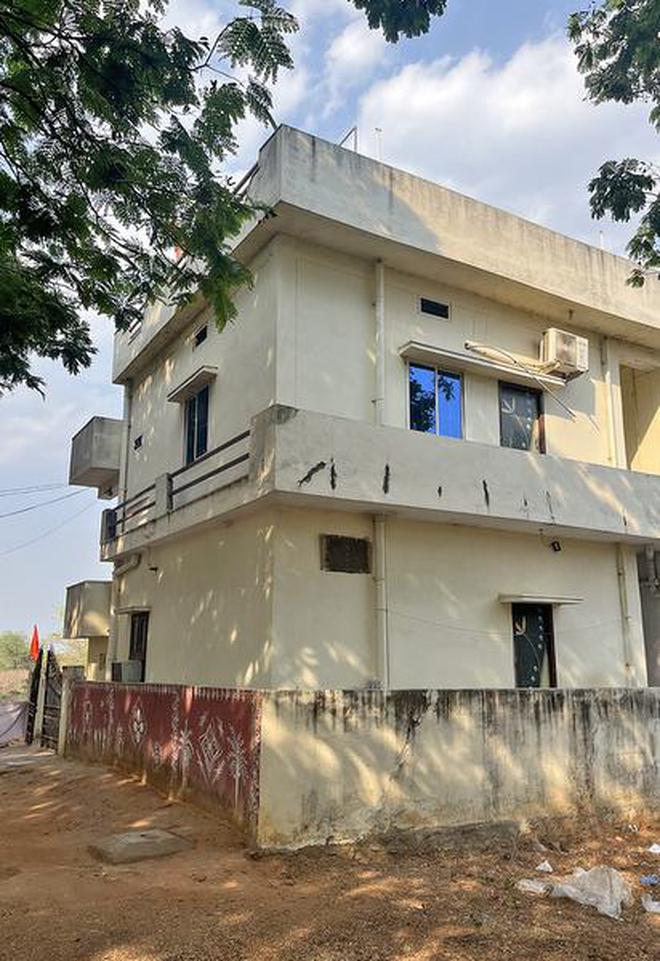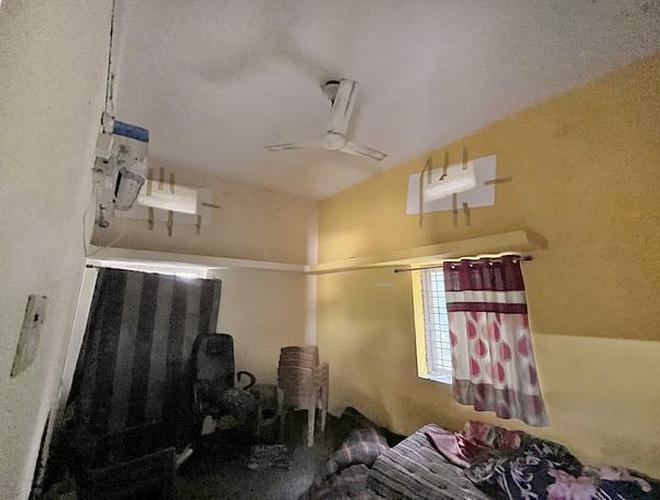Amid the rural landscape of Fasalwadi, around 50 kilometres from Telangana’s capital city Hyderabad, stands a single-storey building with four apartments. The house on the upper right side, designed as a one-bedroom, hall-and-kitchen unit, has the unmistakable smell of a chemical factory. In the kitchen lies a synthesiser coated with a white powdery substance — alprazolam, a drug commonly used to treat sleeping disorders and anxiety.
The illicit manufacturing operation, targeting a 10-kg yield of pure alprazolam, was disrupted midway by a group of 20-odd police officers in the early hours of December 27 last year. Alprazolam, meant to be sold by licensed medical shops with a prescription, has found its way into the illicit market, setting off the public health alarm.
Officials stress the danger of this chemical, highlighting its addictive nature comparable to cocaine. “Just 1 gram of pure alprazolam, priced at ₹1,000, can yield 2,000 to 4,000 doses, given that 0.25-0.5 mg is sufficient to make it an intoxicant,” explains an official of the Excise department.

The apartment in Fasalwadi was leased by Kamal Brahmananda Goud (47), Cheruguri David (59), both Chemistry degree holders, and Kondapuram Shivaraj (29), a private company employee. The property was rented from Sakinala Vinod Kumar (35), who himself had leased it from the owner two years ago. Just three months into their ‘rental agreement’, the trio were in the third stage of drug production; the alprazolam would have been ready in about five days. Their cramped bedroom had an air conditioning unit with huge thermocol sheets plastered across the vents. Their neighbours had no inkling of what was happening next door.
Over 2022-23, up to 43 cases of alprazolam seizures have been reported in Telangana. Last years, about 150 kg has been brought into Telangana from across the country. The State could be dealing with a whopping 13.6 crore doses of this drug, say officials of the Telangana State Anti-Narcotics Bureau (TSNAB).
According to data shared by Telangana’s Excise and Prohibition Department, 38.25 kg of alprazolam was seized in the State in 2023 alone, including 26.3 kg in Sangareddy, 7.6 kg in Kamareddy, 3.6 kg in Nizamabad, and 0.75 kg in Saroornagar. This year too, 1.74 kg of alprazolam was seized in Kamareddy district. In Hyderabad, the TSNAB caught 66 shops selling alprazolam-adulterated toddy, code-named ‘special toddy’, last year. There are about 5,000 shops selling toddy across the State.

Highlighting the concern, M. Padmanabha Reddy, secretary of Hyderabad-based Forum for Good Governance, has written to the Chief Secretary seeking a complete ban on toddy sale in the city. The forum alleges that the toddy sold in the city is adulterated, given the absence of palm trees within a 50-km radius. Juice tapped from the palm tree is fermented and drunk locally as toddy, ideally consumed within the same day. “The non-availability of toddy palm trees in parts of Telangana has resulted in the preparation of synthetic toddy by mixing urad dal paste, water, foaming and colouring agents, and citric acid, and adding substances such as chloral hydrate, diazepam, and alprazolam to induce intoxication,” he explains.
A senior Excise official reveals that only 25% of the alprazolam used in the toddy is manufactured in the State, while the remaining 75% is sourced from other states. According to data from TSNAB, a now-shut-down laboratory based in Hyderabad, was a prominent supplier in the State, from where over 70 kg of alprazolam was seized. While the State has intensified efforts to combat marijuana abuse, the adulterated toddy trade remains largely off the radar.
Toddy adulteration
A similar crisis took place in 2015-2016, when gudumba (illegally distilled liquor) and adulterated toddy resulted in addiction-related hospitalisations. Withdrawal symptoms led to fatalities, prompting the State government to establish detoxification centres. The Institute of Mental Health (IMH) in Hyderabad, was the sole government-run facility with a de-addiction ward. With a steady influx of addiction cases, the government collaborated with a voluntary organisation to put together a support system for its hospitals in Hyderabad district.
Almost a decade later, not much has changed. The shortage of hospitals and de-addiction facilities persists. “The withdrawal symptoms are very painful. Moreover, it is being manufactured with raw materials like benzyl cyanide, which poses grave risk,” says TSNAB director Sandeep Shandilya.
The State has to fight the menace of a drug but does not have enough resources to do so.
While there could be variations in the recipe of alprazolam, it is not something that any amateur can cook up. In the Fasalwadi case, David was a chemist employed in the R&D section of a syntho-chemical company, while Shivaraj had prior knowledge of illegal manufacturing of the drug. The main suspect, Kiran Kumar, was managing director of Parameshwara Chemicals based in the neighbouring State of Andhra Pradesh.
As part of the raid, police had seized 23 different types of chemicals, including 100 litres of benzonitrile, 25 kg of benzyl cyanide, 2.5 litres of ammonia solution and 1.5 litres of dimethyl formamide, among others.
Flow of alprazolam into State
The State police and TSNAB are still working on mapping and tracing the suspects. Officials say the production areas are concentrated in the western belt of the State, spanning Adilabad, Jagtial, Nizamabad, Kamareddy, Rajanna Sircilla, Siddipet, Medak, Sangareddy, and Mahabubnagar. The consumption area, however, is widespread, encompassing major districts like Hyderabad and Rangareddy.
While the issue of illicit alprazolam production persists, there have also been instances of pilferage of alprazolam and similar drugs from pharmaceutical giants. A recent incident involving global company Mylan Laboratories stands as an example, where a few employees were involved in diverting over 21 kg of alprazolam. That led to permanent cancellation of its licence to manufacture the drug by the Drug Licencing Authority in Nizamabad and Telangana’s Drugs Control Administration. “The ‘leakage’ from the pharmaceutical industry is a major concern,” a senior official from the Telangana Excise & Prohibition Department says, seeking anonymity.
Journey of deaddiction
Superintendent of IMH-Erragadda, Dr. M. Uma Shankar says the first step of treating people struggling with adulterated toddy addiction is gathering medical history. “We then get their vitals checked and ask when they last consumed the drink. Then diagnostic tests are conducted to evaluate liver function and overall organ health as well as to identify any underlying issues. Treatment plans are tailored on the basis of these factors, and special attention is given to those with malnutrition or deficiencies,” he says.
IMH typically handles 2-4 cases of toddy addiction daily, with an ongoing caseload of 8-10 individuals undergoing treatment at any given point in time. Dr. Shankar says most patients seeking help hail from rural areas, where misconceptions about the purity of toddy prevail. “The uninitiated and the gullible in the districts assume that it is all-natural and consume it. Before they know it, they are addicted to dangerous substances like chloral hydrate and alprazolam. Hence, it takes longer for their de-addiction, compared to conventional alcohol addiction,” he says, adding that it takes anywhere from a couple of weeks to a month to manage withdrawal symptoms.
He also stresses the importance of timely intervention, as delayed treatment can lead to fatal consequences, particularly for those in a delirious state when being admitted. “Depending on the severity, we either treat people here at IMH or send them to hospitals that are equipped to address specific needs,” he adds.
A targeted programme aimed at combating the illicit trade of alprazolam in the State is currently taking shape and is set to commence in a month or two, a highly placed source in the Telangana’s Excise and Prohibition Department shares. This initiative will not only target the drug producers but also toddy compounds across the State.
“In the past few months, our focus has been on tackling marijuana abuse in Telangana. While we plan to launch an elaborate drive targeting ganja suppliers, we are also gearing up to start a campaign aimed at cracking down on alprazolam manufacturers and adulterated toddy sellers in the next 1-2 months,” the official explains.
Meanwhile, adulterated toddy and alprazolam manufacturing is also on the radar of the TSNAB. “Currently the biggest issue for Telangana is adulterated toddy. That needs to be addressed immediately,” says Shandilya.







